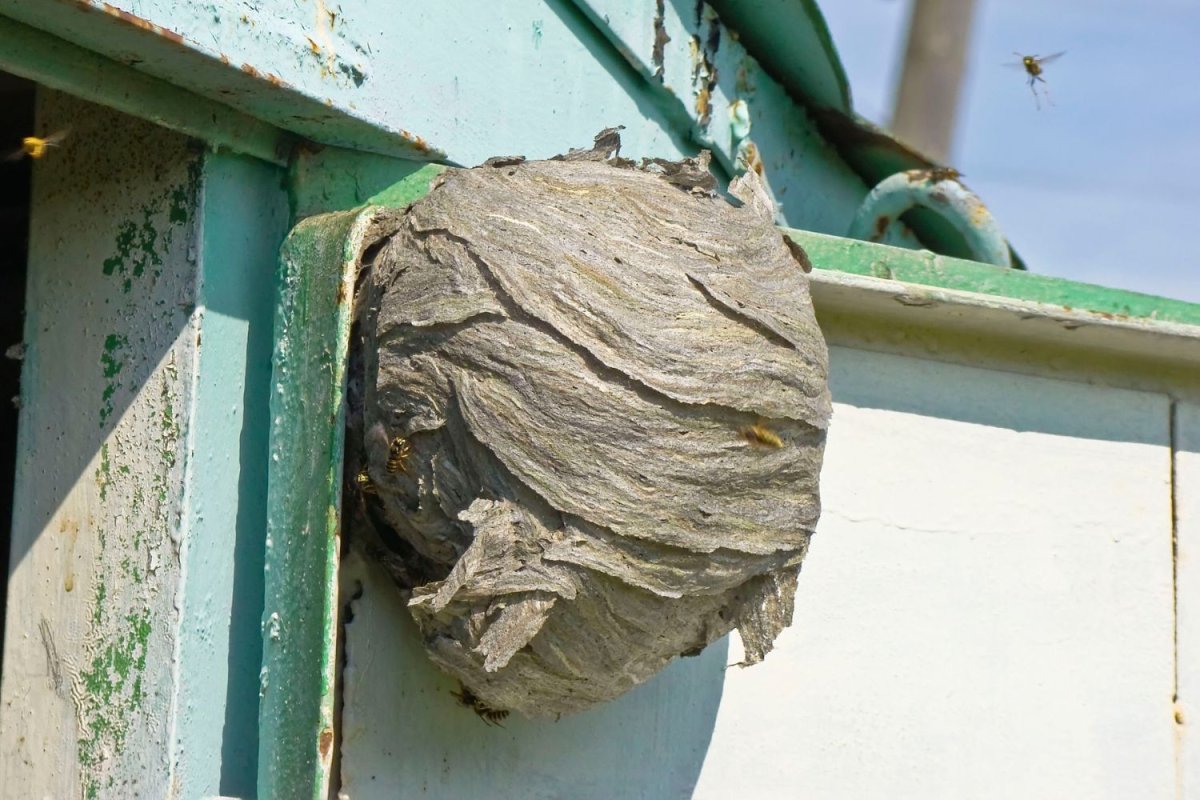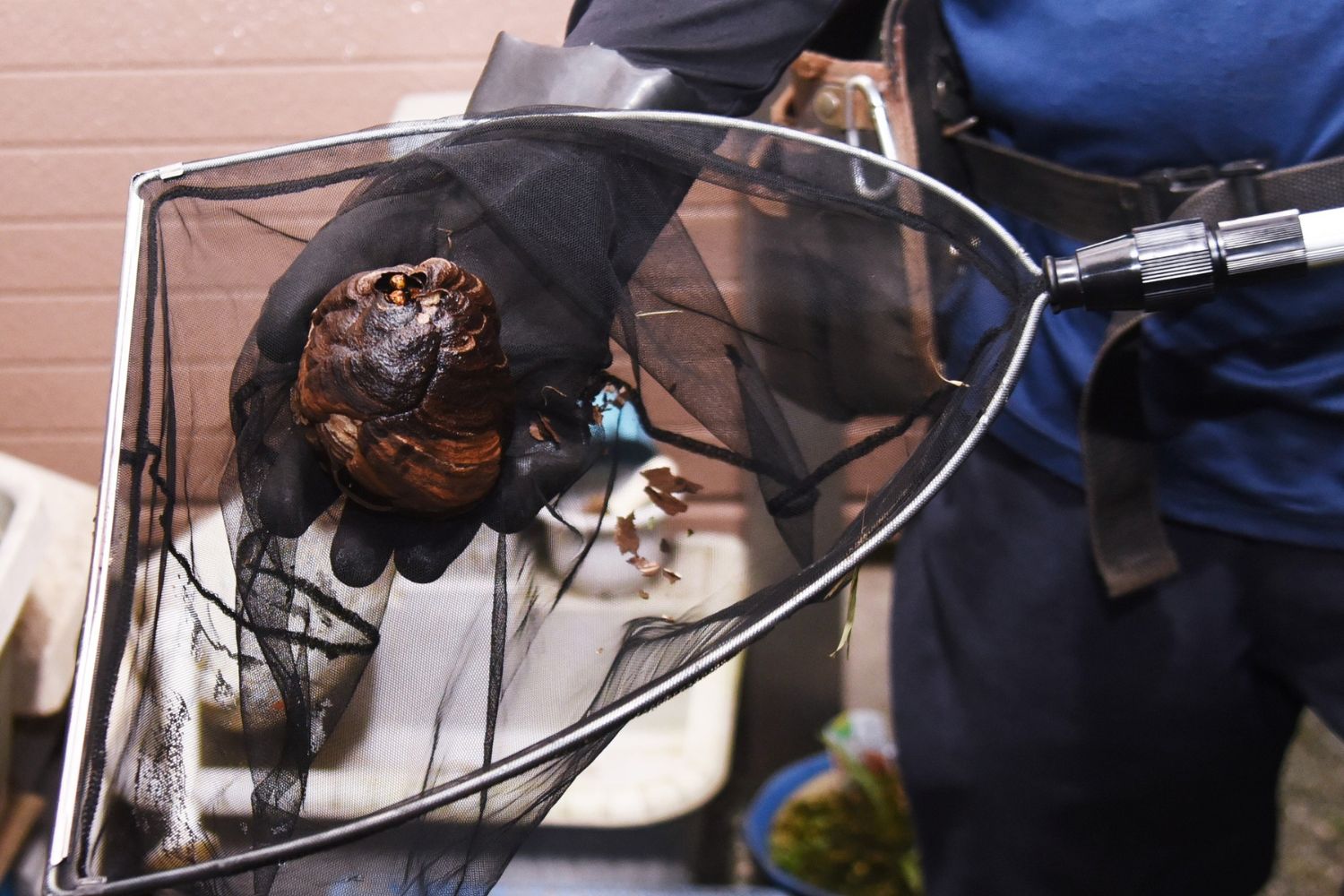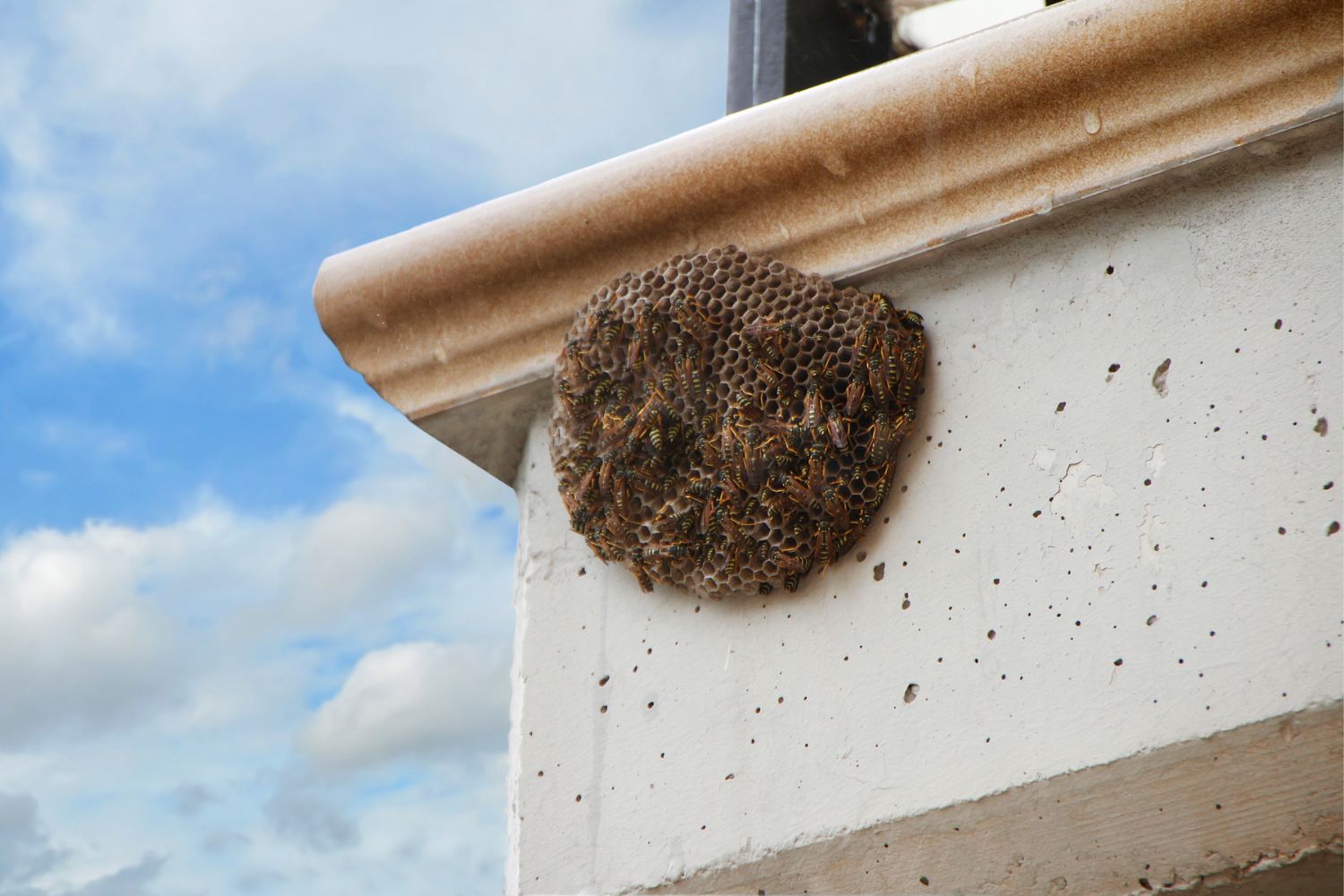

We may earn revenue from the products available on this page and participate in affiliate programs. Learn More ›
- Typical Range: $100 to $1,300
- National Average: $375
Discovering a hornet nest can be unnerving. Some signs of a nearby nest include wasps flying around garbage cans or near landscaping. To completely and correctly remove a hornet infestation, homeowners can consider hiring a professional exterminator. According to Angi and HomeAdvisor, hornet nest removal cost can range anywhere from $100 to $1,300, with a national average of around $375.
While there are differences in the size and look of hornets versus wasps, the difference between a hornet nest vs. wasp nest is minimal, and the nests will look similar. What do wasps do for the environment? They are natural predators. Hornets eat prey such as flies, caterpillars, spiders, and other insects to control the population. The cost of hornet extermination depends on the size of the infestation, the removal method, how accessible the nest is, and more.
Cost Factors
Many factors affect how to approach wasp control and effectively remove an infestation. The cost depends on the method used to get rid of a wasp nest, the size of the infestation, whether any repairs are required after the nests are removed, and more.
Nest Location
Hornets often build their nests in the eaves of a roof, a nearby tree, or another location outdoors. However, this doesn’t mean outside is the only place hornets will go. Hornet nest removal cost depends significantly on whether the nest is inside or outside. Hornet nests are usually more difficult to access inside a home; therefore, inside removal will cost more.
Removing wasps from an attic will cost between $325 and $450. Because an attic is usually more accessible than other interior areas, this type of removal will be easier than it would be for other interior locations. However, if the hornets are in an out-of-reach spot in the attic higher than 10 feet, a fee of $25 or more may be added on.
If hornets are hiding inside a wall, expect to pay anywhere from $350 to $875 for removal. In this scenario, the exterminator will likely drill a small hole in the wall and administer pesticides through it. Once the hornets are exterminated, any home wall repairs are an additional cost.
Hornets can also make their home inside a chimney stack, for which removal costs between $475 and $600. If the hornets are near the top or the bottom of the chimney, the price will be on the lower end because the nest will be easier to get to. A different method is used if the hornets are trapped in the middle of the chimney. The fireplace opening and all vents are blocked off, and a trap is set at the top chimney opening.

Nest Size
The bigger the hornet nest, the bigger the removal cost. A small wasp nest is much easier to get rid of and will take just an hour or two. A large wasp nest could require multiple pesticide treatments over the course of a week before it is completely removed. Hornets will continue to build their nests larger and larger, so residents should do an online search for “wasp exterminator near me” as soon as they notice a nest and get it removed immediately.
Treatment Type
There are multiple methods for how to get rid of wasp nests and hornet nests. The most popular treatment method uses aerosol sprays, which cost upward of $125. This cost varies depending on the type of aerosol spray used and how many treatments are required to remove the colony altogether. Another treatment type is referred to as dusting and costs $200 or more. This method works on outdoor hornet nests that are buried in the ground. A dust is placed in and around the nest that eventually kills the colony. The last common removal method is vacuuming, which costs $250 and up. The exterminator will use a specialized vacuum to clear out hornets embedded in cracks and holes.
Local vs. National Company
When choosing an exterminator, you can hire a local company or a national pest control brand—prices vary for each. In most cases, local companies will charge less for their services, but the initial consultation could come with a fee. National chains tend to offer a free initial inspection but charge more overall for their services. Homeowners can research the best pest control companies near them (such as Terminix, Orkin, and Erlich) to decide which route makes the most financial sense.
Home Repairs
When hornets are in a difficult-to-access area like inside an interior wall, part of the wall may need to be removed to reach the nest. In these cases, expect to pay an additional $500 to $1,400 for any drywall, framing, or paint repair required once the hornets are gone. Alternatively, a carpenter charges around $70 per hour and will take a few hours to complete these kinds of repairs. A situation like this is rare, but it is important for homeowners to keep the cracks and holes in the exterior of their home sealed so hornets cannot get inside.

Hornet Nest Removal Methods
As with other kinds of pest control, there is more than one way to get rid of hornets. Three popular methods include aerosol spraying, dusting, and vacuuming.
Aerosol
Standard treatment for how to get rid of hornets’ nests is with aerosol sprays. A chemical solution is sprayed directly on the nest that destroys the colony. This service starts at $125 for a typical pesticide aerosol wasp spray that contains harsh chemicals like tetramethrin and prallethrin. The best wasp sprays typically contain these chemicals. Eco-friendly, all-natural aerosols are also available, but they will cost a little more at $150 and up. Aerosol sprays are only meant to be used on outside hornet nests, as the chemicals can be toxic to humans and pets. If a hive is located inside, it will need to be moved outside before any spraying can happen—this nest transportation will cost an additional $100 or more. The best time to spray a wasp or hornet nest is in the evening or at night when the wasps are less active.
Dusting
Dusting is used to remove hornet nests buried in the ground and costs upward of $200. A dust containing permethrin is placed in and around the buried nests. The dust then sticks to some of the hornets’ bodies who carry it deeper into the nest and to the rest of the colony. Eventually, the hornets will succumb to the permethrin, and any remaining chemical will deter other hornets from building a nest in that area.
Vacuuming
Vacuuming as a hornet or wasp nest removal method works exactly as it sounds. Starting at $250, this process involves an exterminator vacuuming out hornets from any cracks or holes they might be living in. The vacuum is a special type of device meant for insect removal that targets the small crevices these pests use to enter a home. In some cases, once the wasps are captured, they are sent to a medical lab to create the antidote necessary to treat wasp stings.

Do I Need Hornet Nest Removal?
Hornet nests don’t need to be removed in every situation. Two main factors that come into play when considering hornet nest removal are whether the nest is active with hornets and how close it is to a home.
Presence of Hornets
If a hornet nest is active and you constantly see the insects flying in and out, it is a good idea to have the nest removed. On the other hand, if you don’t see any hornets around a nest for a long period of time, it might be inactive and abandoned. In this case, the nest doesn’t necessarily have to be removed as it will eventually deteriorate from harsh weather conditions like wind and rain. You may still choose to have the abandoned nest removed, however, for peace of mind, but this can generally be a DIY project, as there is no danger once the hornets have left the nest.
Close Proximity of Nest to House
If a hornet nest is close to a house, it poses a risk to the people and pets coming and going. Hornet stings can be dangerous to humans, especially for those who are allergic to that type of hornet or receive multiple stings. A hornet nest buried in the ground is very risky for households that have pets and should be removed as soon as possible.
DIY vs. Hiring a Professional
Deciding whether or not to hire a professional pest control provider to remove a hornet infestation ultimately comes down to the size and location of the hive. In some cases, a hornet nest might be small and accessible enough to warrant DIY removal. A pesticide aerosol spray available at a local hardware store is what kills wasps and might be the right solution for removing the hive.
However, hiring a professional is the best option if the hive is larger in size or in a difficult-to-reach area. Additionally, when using a DIY hornets’ nest removal method, there’s the added risk of potential insect stings that can cause allergic reactions. Homeowners who do not have the proper protective equipment, like gloves or goggles, will need to purchase this to safely spray the nest, which adds to the cost and could still leave the homeowner at risk for stings if the equipment is not worn properly.
Pest control companies have all the equipment and experience necessary to properly remove the hornet infestation. Hiring a professional will lower the risk for the homeowner and increase the chance that the extermination is successful. An exterminator might have to use ladders or other equipment to access the hive. Fortunately, pest control technicians are trained for this type of work. Additionally, professional exterminators know how to stop wasps from coming back by thoroughly treating and removing the hive.
How to Save Money
To save money on hornet nest removal, consider implementing one or a few of the following cost-saving tips.
- Locate all the hornet nests yourself so that the exterminator can shorten the inspection time required.
- Obtain multiple price estimates from different exterminators to compare prices and services and choose the option that provides the best value.
- Remove any obstacles that might be in the way of removing the hornet nest before pest control services begin.
Questions to Ask About Hornet Nest Removal
Before hiring a hornet nest exterminator, homeowners may want to ask the professional these questions to qualify and compare the services of various providers. These pest control selection tips and questions help ensure the exterminator is qualified for the job.
- Are you licensed and insured for this type of work?
- How much experience do you have with this type of hornet?
- What hornet removal method do you recommend?
- Are the products you use safe around pets and children?
- How long will the removal process take? Are multiple treatments required?
- What happens if the hornets’ nest comes back? Do you offer a guarantee on your work?
- Do you provide a written estimate and contract to sign?
- Can you locate all the hives on my property?
FAQs
Before hiring a pest control expert to remove hornet nests, consider the following frequently asked questions that offer more information on the extermination process.
Q. Can you remove a hornets’ nest yourself?
You can remove a hornets’ nest yourself if you have the proper equipment and experience. The basic steps for how to get rid of hornets include locating the nest, spraying it with a pesticide aerosol spray, and disposing of the nest once there is no more hornet activity. You may have to spray the nests multiple times to ensure all the hornets are killed. Professional exterminators know how to get rid of a wasp nest the proper way, making them a helpful resource for many homeowners.
Q. How many hornets are in a nest?
A hornets’ nest typically has between 100 and 700 inhabitants. A few of the hornets will be breeding queens and the rest are non-breeding worker hornets. The number of hornets is usually proportional to the size of the hive.
Q. Do hornets return to old nests?
Hornets do not return to old nests. The queen hornets build new nests each spring after winter hibernation. It is still a good idea to remove old, out-of-use hornet nests so they do not attract other insects, but in most cases, hornets will not return to these old nest spots.
Q. How long does a hornets’ nest last?
A hornets’ nest will not last longer than a year. The nests are usually created each spring by the queen hornet and then abandoned for winter hibernation. The wind and rain conditions in late fall will often disintegrate the hives.
Q. What kills hornets instantly?
Aerosol hornet-killing sprays are what kills wasps instantly (including hornets). These sprays contain pesticides like tetramethrin and prallethrin that destroy hornet nests. Depending on the size of the nest and number of hornets, multiple spray treatments might be needed to fully get rid of the hive.
Q. What happens to hornets when their nest is destroyed?
When a hornets’ nest is destroyed and removed, if enough hornets survive, they will rebuild a nest nearby. If there are not enough hornets around to rebuild a new nest, they will travel to find another hornet colony or hornet nest to reside in.
Sources: Angi, HomeAdvisor, Fixr, Insight Pest Solutions
